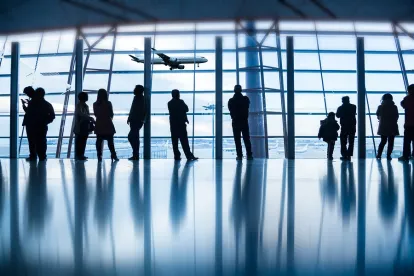As summer approaches and countries begin to re-open, some companies and individuals are thinking about resuming international travel. If international travel is required for your work or other reasons, be prepared for strict restrictions and potential last-minute cancellations. This GT Alert provides considerations with respect to international travel amid the Coronavirus Disease 2019 (COVID-19) pandemic.
1. U.S. Embassies and Consulates Continue to Offer Limited Services Worldwide
In March 2020 U.S. embassies and consulates suspended routine visa services until further notice. However, during the last few weeks, several jurisdictions have re-opened visa appointment calendars for the summer months. Although there is no official guidance from the Department of State, visa applicants should schedule their visa appointments as soon as calendars are opened to get in queue, as there may be long processing and wait times due to case backlog. However, these visa appointments may be rescheduled by the embassy with little or no warning, as the COVID-19 situation remains fluid. In most cases, a visa appointment will be re-scheduled at no additional cost, with DS-160 forms remaining valid for one year. Specific U.S. embassies/consulates are implementing the following:
-
France: The U.S. Embassy in Paris opened its calendar in May, and non-immigrant visa applicants were able to schedule visa appointments beginning in June. During the week of May 18, the embassy cancelled all June visa appointments. As of the date of this alert, the calendar is open starting in July, and individuals can schedule appointments.
-
Italy: Visa appointments remain suspended until further notice.
-
Sweden: The embassy has opened its calendar for the summer months. However, processing times may increase due to limited staffing.
-
Mexico: Visa applicants can schedule appointments beginning in July. No cancellation of appointments has occurred to date. Consulates continue to accept nonimmigrant visa applications on a limited basis for emergency travel only.
-
Argentina: Visa applicants can schedule visa appointments beginning in July.
-
Brazil: Embassies and consulates have cancelled all routine visa appointments but continue to provide emergency and mission-critical visa services as resources and local conditions allow. The embassy is currently unable to provide a specific date for when normal visa services will resume. The United States is instituting a travel ban into the U.S. on Brazilian nationals effective May 26, 2020, 11:59 p.m. EDT.
-
Chile: The U.S. Embassy in Santiago has suspended routine consular visa services until further notice.
-
India: U.S. visa application centers located at New Delhi, Mumbai, Chennai, Hyderabad, and Kolkata, and the six document delivery centers located at Jalandhar/Chandigarh/Pune/
Ahmedabad/ Bangalore/ Cochin will remain closed until further notice. -
Japan: Consular services remain suspended. Visas are only being issued in cases of emergency.
2. Country-Specific Entry Requirements and Movement Restrictions
As the COVID-19 situation remains fluid on a global scale, all international travelers should remain flexible with their travel plans. Current travel bans and restrictions notwithstanding, most nationals are allowed to return to their home countries. In some cases, a visa applicant may not be required to appear for a visa appointment in their home country. However, if it is decided that the visa applicant will travel to a third country (not their home country) to obtain a visa, consider that the country may be restricting foreigner entry. If allowed entry, the applicant may be required to self-quarantine for 14-30 days before being permitted to appear for a visa appointment. Also, depending on the visa applicant’s nationality, the visa applicant may be required to obtain a visa to enter the third country. Following are country-specific entry requirements and movement restrictions.
-
France: The French government has closed its international borders in large part, and travel within Schengen is significantly restricted. International travelers arriving in France must self-isolate for 14 days if they have no symptoms. If someone is displaying symptoms, they must self-isolate for 30 days. International travelers must carry an attestation form (see attestation form in French; see attestation form in English), and anyone within France must also carry an attestation form when leaving their residences.
-
Italy: The Italian government has imposed strict movement restrictions. All travelers must carry a self-declaration form specifying the purpose of their movement and destination. Seethe self-declaration form here. Furthermore, all international travelers are subject to a mandatory 14-day self-quarantine, regardless of symptoms. Although there is no specific guidance from the Department of State, international flights may resume in June, and U.S. embassies and consulates may re-open shortly thereafter.
-
Sweden: Inbound travel from non-EU countries will continue to be restricted until June 15. Most non-stop flights from Sweden to the United States have been suspended. Commercial flight options to the United States remain available from Stockholm via Paris, Frankfurt, and Amsterdam, limited by each country’s specific restrictions.
-
Mexico: The U.S. and Mexican governments have extended land border travel restrictions until June 22. Individuals arriving via air are subject to health screenings. Those exhibiting symptoms are subject to additional health screening and quarantine.
-
Argentina: The Argentine government has imposed strict movement restrictions, which are region-specific. Per the latest Argentine government policy, any foreigner who is not a resident in Argentina will not be permitted to enter Argentina. The U.S. Embassy has stated it is not aware of an estimated end date for this travel ban. Multiple countries in the region are implementing travel restrictions with little advance notice.
-
Brazil: Brazil has imposed a ban on foreigners entering the country by air through June 21.
-
Chile: Chile’s borders have been closed to foreigners since March 18. Chile has declared preventative quarantine for parts of Santiago and nationwide curfew requirements from 10:00 p.m. – 5:00 a.m. To leave residences during this time, a permit must be obtained from the police.
-
India: India has imposed strict travel restrictions on foreigners. Depending on the country passengers arrive from, there may be a mandatory 14-day self-quarantine period. Anyone arriving by air is also subject to health screening and testing.
-
Japan: On May 25, the state of emergency was lifted for all of Japan. However, some local authorities continue to request restricted hours and/or closures of public venues. Japan’s international borders remain essentially closed to foreigners.
3. President Trump’s Executive Order
On April 22, 2020, President Trump signed an executive order entitled Proclamation Suspending Entry of Immigrants Who Present Risk to the U.S. Labor Market During the Economic Recovery Following the COVID-19 Outbreak. This executive order only affects the issuance of immigrant visas (green cards) at U.S. embassies and consulates abroad until June 22, 2020. However, the executive order specifically mandates the Department of Labor, the Department of Homeland Security, and the Department of State to review non-immigrant visa programs and recommend other measures that will protect the hiring and employment of U.S. workers. A new executive order that could further restrict the issuance of non-immigrant visas at U.S. embassies and consulates worldwide may be issued in the coming weeks.
4. Bottom Line
Travel restrictions, embassy/consulate closures, and health restrictions are being implemented and updated by governments on a regular basis. If international travel is required, plan early and confirm required documentation and information for each country before departure. Also, remain flexible and be prepared for delays.




 />i
/>i

